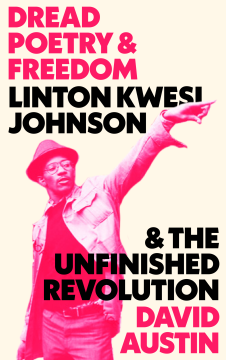
Additional Information
Book Details
Abstract
What is the relationship between poetry and social change?
Standing at the forefront of political poetry since the 1970s, Linton Kwesi Johnson has been fighting neo-fascism, police violence and promoting socialism while putting pen to paper to refute W.H. Auden's claim that 'poetry makes nothing happen'. For Johnson, only the second living poet to have been published in the Penguin Modern Classics series, writing has always been 'a political act' and poetry 'a cultural weapon'.
In Dread Poetry and Freedom - the first book dedicated to the work of this 'political poet par excellence' - David Austin explores the themes of poetry, political consciousness and social transformation through the prism of Johnson's work. Drawing from the Bible, reggae and Rastafari, and surrealism, socialism and feminism, and in dialogue with Aime Cesaire and Frantz Fanon, C.L.R. James and Walter Rodney, and W.E.B. Du Bois and the poetry of d'bi young anitafrika, Johnson's work becomes a crucial point of reflection on the meaning of freedom in this masterful and rich study.
In the process, Austin demonstrates why art, and particularly poetry, is a vital part of our efforts to achieve genuine social change in times of dread.
' 'Dread, Poetry and Freedom' offers an expansive exploration of Caribbean political and cultural history, from Rastafari in Jamaica and Walter Rodney and Guyana to the Cuban Revolution with impressive articulations of the significance of Fanonism. Caribbean political theory is animating literary and cultural studies diasporically; this work demonstrates this elegantly'
Carole Boyce Davies, author of 'Caribbean Spaces', Professor of Africana Studies and Literature at Cornell University
'David Austin offers nothing less than a radical geography of black art in his (re)sounding of Linton Kwesi Johnson. You don't play with Johnson's revolutionary poetry, Austin teaches, and 'Dread, Poetry and Freedom' is as serious, and beautiful, as our life'
Fred Moten, poet, critic and theorist
'A moving and dialogic musing on freedom. Austin's richly textured study reads LKJ's poetry in relation to an expansive tradition of black radical politics and poetics. It captures both the urgency of Johnson's historical moment and his resonance for ours'
Shalini Puri, Professor of English, University of Pittsburgh
'With the intensity of a devotee and the precision of a scholar, David Austin skillfully traverses the dread terrain of Linton Kwesi Johnson's politics and poetry, engaging readers in an illuminating dialogue with diverse interlocutors who haunt the writer's imagination'
Carolyn Cooper, cultural critic, author of 'Noises in the Blood: Orality, Gender and the 'Vulgar' Body of Jamaican Popular Culture'
Table of Contents
| Section Title | Page | Action | Price |
|---|---|---|---|
| Cover | Cover | ||
| Contents | vii | ||
| Acknowledgements | viii | ||
| Preface | xi | ||
| Prologue | 1 | ||
| 1. The Poet's Routes | 10 | ||
| 2. Dread Dialectics | 44 | ||
| 3. Dread Poetry and Freedom | 80 | ||
| 4. Politics and Mourning in 'Reggae fi Radni' | 114 | ||
| 5. The Wise Old Shepherd | 149 | ||
| 6. The Good Life | 170 | ||
| 7. More Time | 187 | ||
| 8. Searching for the Fantastic | 207 | ||
| Post-Apartheid Postscript | 221 | ||
| Notes | 223 | ||
| Index | 278 |
